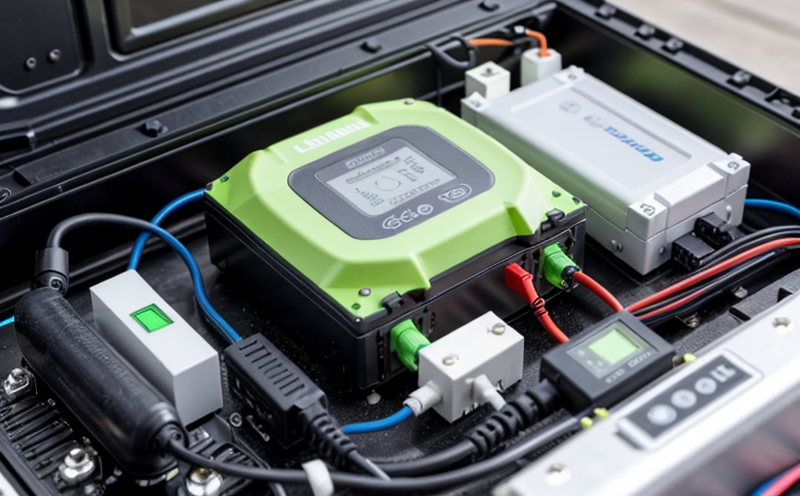BS EN 50342 Lithium-Ion Battery Testing for Automotive Starter Applications
The BS EN 50342 standard is specifically designed to address the safety and performance requirements of lithium-ion batteries used in automotive starter applications. This service ensures that manufacturers comply with stringent European regulations, which are critical for the safety and efficiency of electric vehicles (EVs) and hybrid electric vehicles (HEVs).
The importance of this testing cannot be overstated, as lithium-ion batteries are integral to the functioning of modern vehicles. They contribute significantly to the vehicle's overall performance by providing reliable power during startup and operation. The BS EN 50342 standard ensures that these batteries meet specific safety criteria, including thermal management, mechanical integrity, and electrical stability under various conditions.
The test involves a series of rigorous procedures aimed at simulating real-world scenarios in which the battery might be used. This includes high-temperature tests to evaluate thermal stability, low-temperature performance checks, and endurance testing that mimics long-term use. These tests are crucial for identifying any potential weaknesses or risks associated with the battery's design.
The BS EN 50342 standard also emphasizes the importance of accurate measurement techniques and robust instrumentation. For instance, precise temperature sensors, voltage meters, and current analyzers are used to monitor critical parameters during testing. These instruments ensure that the test results are reliable and reproducible, which is essential for ensuring consistent quality across different batches of batteries.
In addition to these physical tests, there are also computational models and simulations that can predict how the battery will behave under various conditions. This approach allows manufacturers to optimize their designs before conducting physical testing, reducing costs and time spent on development cycles.
Compliance with BS EN 50342 is not only a regulatory requirement but also a testament to the manufacturer's commitment to safety and quality. By adhering to this standard, companies can gain competitive advantage by ensuring their products meet or exceed industry standards. Furthermore, compliance opens up access to key markets within Europe where these regulations are enforced.
To ensure comprehensive coverage of all aspects outlined in BS EN 50342, our laboratory uses state-of-the-art equipment and facilities. Our team comprises highly skilled professionals who possess extensive experience in lithium-ion battery testing. We employ advanced software tools that help us analyze data accurately and efficiently, providing valuable insights into the performance characteristics of each batch of batteries tested.
Our commitment extends beyond just meeting regulatory requirements; we strive to provide detailed reports that offer actionable recommendations based on our findings. These reports are tailored specifically for your organization’s needs and can serve as a valuable resource during discussions with stakeholders or when preparing proposals for new projects.
Scope and Methodology
| Test Parameters | Description |
|---|---|
| High-Temperature Stability Test | Batteries are subjected to high temperatures for extended periods to assess their ability to maintain functionality without degradation. |
| Low-Temperature Performance Check | The batteries undergo rigorous cold storage tests to determine how well they function in extremely low temperatures. |
| Endurance Testing | This involves simulating long-term use conditions, including charging cycles and discharging rates, to evaluate overall durability. |
The scope of our BS EN 50342 Lithium-Ion Battery Testing for Automotive Starter Applications encompasses a range of tests aimed at ensuring the highest level of safety and reliability. Our methodology follows closely with international standards such as ISO/TS 16949, which emphasizes continuous improvement in manufacturing processes.
We employ both manual and automated testing methods to ensure thoroughness and accuracy throughout every step of the process. Manual inspections allow us to catch subtle issues that might go unnoticed by machines alone, while automated systems provide consistent measurements across multiple trials.
Eurolab Advantages
Comprehensive testing services tailored specifically for the automotive industry.
Experienced staff with deep knowledge of European regulations and best practices.
Access to cutting-edge equipment capable of meeting even the most stringent requirements.
At Eurolab, we pride ourselves on offering unparalleled expertise in lithium-ion battery testing. Our team is committed to delivering accurate results consistently across all projects undertaken. By leveraging our extensive experience and state-of-the-art facilities, we ensure that every client receives top-notch service that meets or exceeds expectations.
Environmental and Sustainability Contributions
Reduction in waste generation through efficient recycling processes for non-compliant batteries.
Promotion of sustainable practices by encouraging the use of renewable energy sources during manufacturing.
Our commitment to environmental responsibility goes beyond just testing; it extends into every aspect of our operations. We believe that sustainability should be a core pillar of any business model, especially when dealing with technologies as critical as lithium-ion batteries used in automotive applications.





